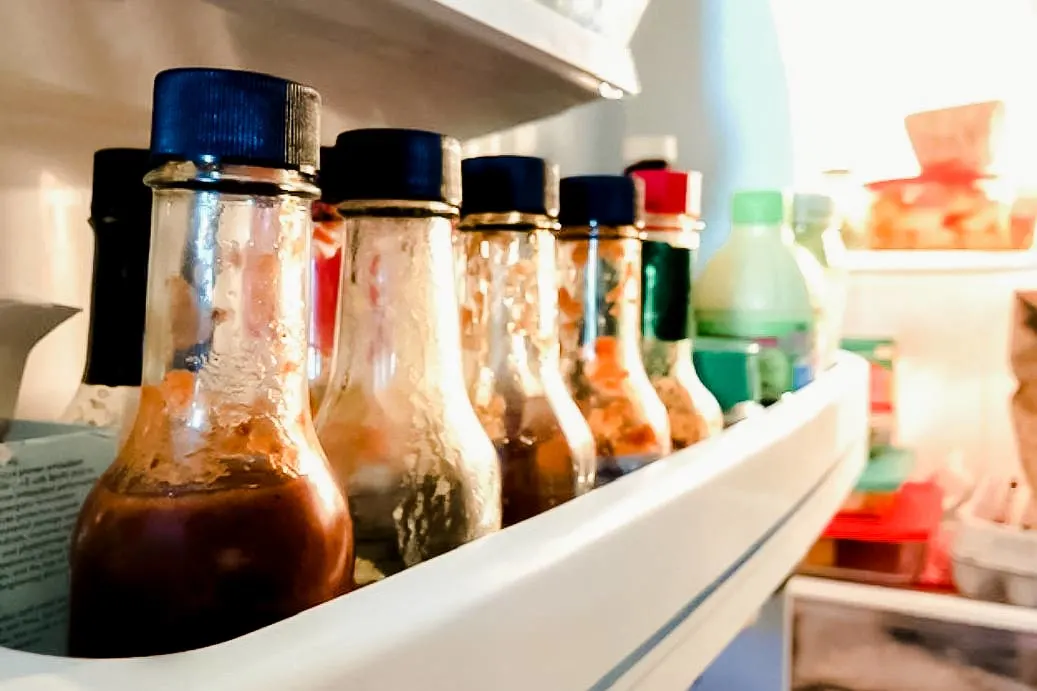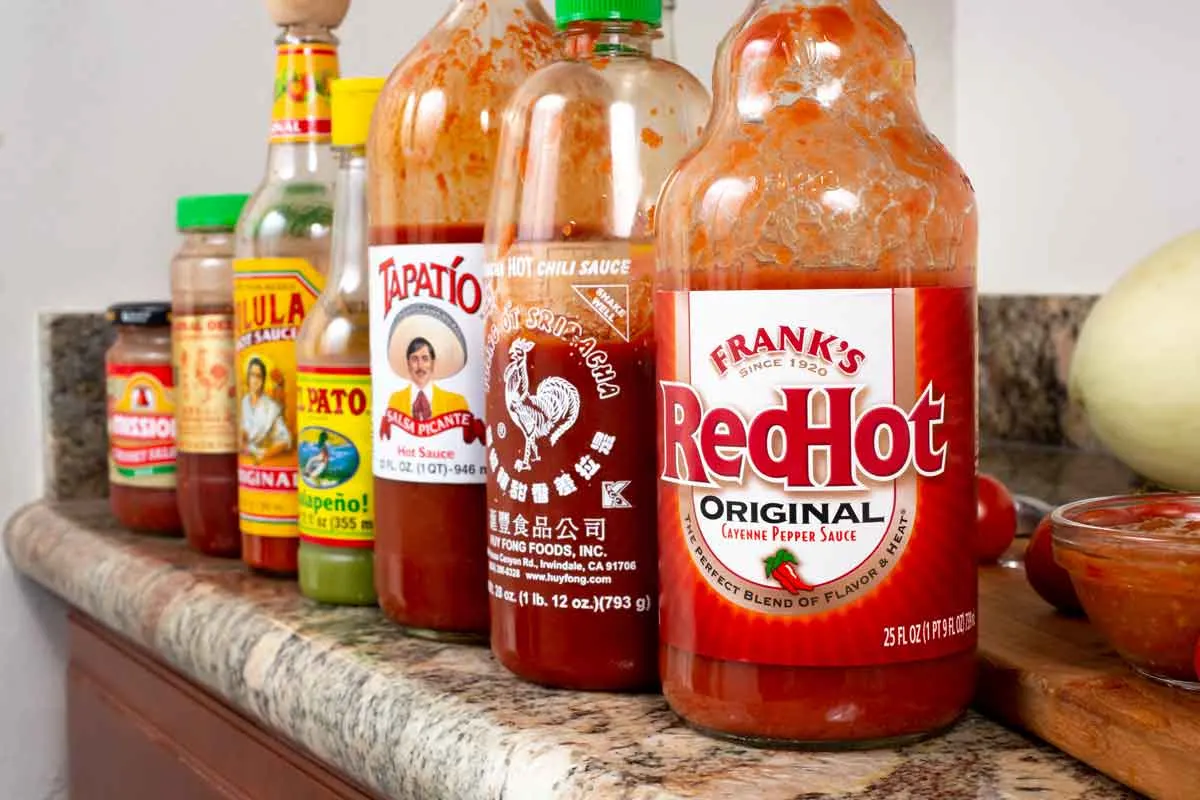Hot sauces come in many different types, but there is usually one commonality: they contain peppers. Many sauces also contain sweet foods like onion, tomato, pineapple, peaches and more. With so many fresh ingredients, you’ve probably wondered, does hot sauce go bad?
In short, some hot sauces can go bad, though the shelf life is typically 1 year or longer when stored in the refrigerator. This is thanks to a low pH value, though this can vary depending on the sauce.
However, despite many sauces containing vinegar to help with preservation, the perishable ingredients can eventually invite mold and bacterial growth over time. This is why, in most cases, it is best to store your opened hot sauces in the refrigerator.

Colder temperatures slow down the growth of molds, keeping your sauces fresh for longer. Read the packaging and if it says to refrigerate, do it!
However, hot sauces have some benefits that make spoiling less likely than other foods.
- Vinegar. Vinegar is highly acidic, and thus not an easy place for bacteria to grow. Not all sauces contain vinegar, but many are high in it.
- Fermented peppers. In many cases, the peppers within hot sauce have been fermented. Lacto-fermentation produces a highly acidic environment great for preservation.
- Capsaicin. This is the chemical compound that makes hot peppers hot. It has also been shown that capsaicin exists in pepper plants in order to deter the growth of mold and bacteria. It can help keep your hot sauces longer.
Because of the preservation characteristics of these ingredients, some sauces, like Cholula and Tabasco are typically not refrigerated. This is why you’ll often see them kept on the tables in various diners and restaurants. The low pH level prevents the growth of unwanted bacteria & mold.
Overall, most hot sauces have a very long shelf life, especially before being opened. If you are unsure of your hot sauce, a simple inspection can help you determine whether the sauce is still safe to eat.
Often, homemade hot sauces will not last as long as store-bought sauces.
How Can I Tell When Hot Sauce Is Bad?
Hot sauce tends to let you know when it has gone bad. Many of us have old, forgotten bottles of hot sauce, keeping them in case the mood ever strikes. However, like most foods, hot sauce can eventually spoil. So how can you tell if your hot sauce has gone bad?
In short, check the hot sauce for an unusual appearance or smell. If any of these seem off, don’t risk it, just throw it away. It can be painful to throw away a once-good hot sauce, but it’s better safe than sorry! If your hot sauce tastes unusual, it is best discarded as well.
Use these methods to inspect your hot sauces for spoiling:
- Look. If your hot sauce appears to have spots of fuzzy mold, throw it away. However, discoloration (fading) is normal with oxygen exposure, and is not necessarily a cause for concern. Basically, if something appears to be growing on your hot sauce, it’s time to say goodbye.
- Smell. Next is to check on the smell. Notice a sour or rotten smell? If the smell makes you want to gag or grimace, you’ll know it’s time for the sauce to go. If it smells as delicious as ever, it is probably still okay to eat.
- Taste. If it seems off, slimy or unusual in any way, spit it out.
Note: “Sell by” or “Use by” dates are a good indicator of freshness, but a passed date does not always mean that food is spoiled. However, if you see that the “expiration date” has passed, the food is no longer considered safe to eat.
Is It Okay If Hot Sauce Changes Color?
The original color of a hot sauce is often vibrant and colorful. This is due to the freshness of the ingredients and the lack of oxygen in the bottle. Once you open a bottle and begin using it, the oxygen can discolor the sauce.
This is caused by the same process that turns an apple dark after it has been cut open. Discolored hot sauce is usually nothing to worry about.
Many hot sauces will eventually turn from red, green or orange to brown due to oxidation. This is a natural process that occurs when your hot sauce makes contact with the air, breaking down its chemical composition. This can negatively affect flavor over long periods of time.

Does Hot Sauce Need to Be Stored in the Refrigerator?
If you’re anything like me, you have a lot of hot sauces. Last time I counted, there were 58 opened bottles in our fridge (and counting). Hot sauces offer great variety of flavors and uses, so it’s no wonder they’re so popular.
However, there’s only so much space in the refrigerator, and most “normal” people like to keep things like fruits and vegetables instead of hoarding hot sauces. So you might wonder: Does hot sauce need to be refrigerated?
Simply put, yes, most hot sauces should be stored in the refrigerator after being opened. However, many can remain shelf stable for well over a year before breaking the seal.
Vinegar Hot Sauces
Vinegar is a natural preservative with a high acidity level. This is why most homemade hot sauce recipes call for 30-50% vinegar on the ingredient list.
Most store bought hot sauces are also vinegar-based, and this helps give them a longer shelf life. Many commercial hot sauces are also heated to high temperatures in order to destroy harmful bacteria and molds from forming in the bottles.
During the bottling process, hot sauce is typically pasteurized and hermetically sealed. This creates a closed, air-tight environment, free from bacteria. It is also the reason you hear a little “pop” when you open up a new bottle of hot sauce.
This is the sound of air quickly entering the bottle and releasing the seal. After the seal has been broken, even vinegar-based sauces should be stored in the refrigerator until they are consumed.
Note: We have kept certain vinegar based sauces out of the refrigerator for months without any issue (ex. Tabasco (70% vinegar), Cholula and Frank’s RedHot), but this is typically not advised.
Keeping sauces at room temperature is inviting the potential growth of bacteria and molds, as these tend to thrive in warm, moist environments (like inside your hot sauce bottles). As a rule of thumb, vinegar based sauces are better at keeping, but should still be stored in the fridge for safety.
Fermented Hot Sauces
While vinegar based sauces are popular, some people don’t like the flavor or have an intolerance to highly acidic foods. This is where fermenting can help. While fermentation does cause lactic acid to form, the sauces are often less harsh than those that use white or apple cider vinegar.
Fermentation involves live, good bacteria breaking down your vegetables into simpler molecules. This causes the formation of lactic acid, which helps preserve the vegetables.
However, these live bacteria are not killed off during the process, and this is one of the health benefits of eating fermented foods. Lactobacillus is the gut-healthy bacteria present during fermentation that can help regulate digestion.
What does this mean for storing fermented hot sauces? It means that you should refrigerate after reaching the desired level of fermentation. The process will continue in the refrigerator, but at a much slower rate.
Also, blending the peppers after fermentation exposes the peppers to oxygen, inviting bad bacteria and mold to grow. Oxygen is the enemy of a healthy ferment, so always store your finished hot sauces in the refrigerator!
Note: Always check the pH of your homemade fermented hot sauce using a high quality pH meter.
Read Next:
- Simple habanero hot sauce recipe
- Make your own fermented hot sauce
- How to grow jalapeño peppers in pots
I hope this article helps you feel comfortable with knowing when your hot sauce has gone bad. The best solution is to keep your sauces sealed until you’re ready to use them frequently.
If you have the space, always keep your opened hot sauces in the fridge! Enjoy.


Russell
Monday 22nd of May 2023
What does it mean if it gets cloudy at the top? Is that mold? There's nothing anywhere else and it seems to dissolve when I shake it.
Sara S
Thursday 3rd of June 2021
What if I have white dots on the bottom? No where else..just a few speckles in varying sizes on the bottom and around the base sporadically...there are air pockets with no mold or anything higher up in the bottle, the color is perfect like when i bottled it, i just have lots of white dots... Is this capsaicin? This is a homemade red savina hab hot sauce with a pH of 3.6 when created, (i have been maintaining high standards for my bottling conditions so far with star san etc). It was my biggest bottle and has been on the shelf the longest. Thoughts?
Ron Wilkerson
Tuesday 18th of August 2020
I have 2 skull bottles of hot sauce that taste close to Tabasco sauce. They are unopened. I have had them for bout three years now. Would they still be good?
peppergeek
Tuesday 18th of August 2020
Hi Ron,
The sauce is most likely okay to eat if they were not opened. Tabasco style sauces are usually high in vinegar, thus shelf life is long. Just give them a good look and smell before tasting. If anything looks or smells funky, chuck it.
-Calvin
Sean
Monday 4th of November 2019
I am wondering about it, I had taken a ton of Verde sauce home from a local burrito shop, and my mom ate some last night, she ended up with what's seeming to be food poisoning. The only thing that I can think of is that there had been a period where it was unrefrigerated for at least 24 hours. I used some 2-3 days before she did, and I did not experience any issues. But she ate it and she's been sick since last night.
So I am wondering if green sauce, made locally could go bad faster than storebought, and maybe what could explain why.
peppergeek
Tuesday 5th of November 2019
Hi Sean, sorry to hear about your mom getting sick. It could be that the Verde sauce lacks enough vinegar or capsaicin to keep the sauce from spoiling. Green sauces are more like salsa than hot sauce, so they tend to have little or no vinegar. Especially with locally made Verde, they may not have pasteurized the sauce, etc. Good luck, and I hope she feels better soon!